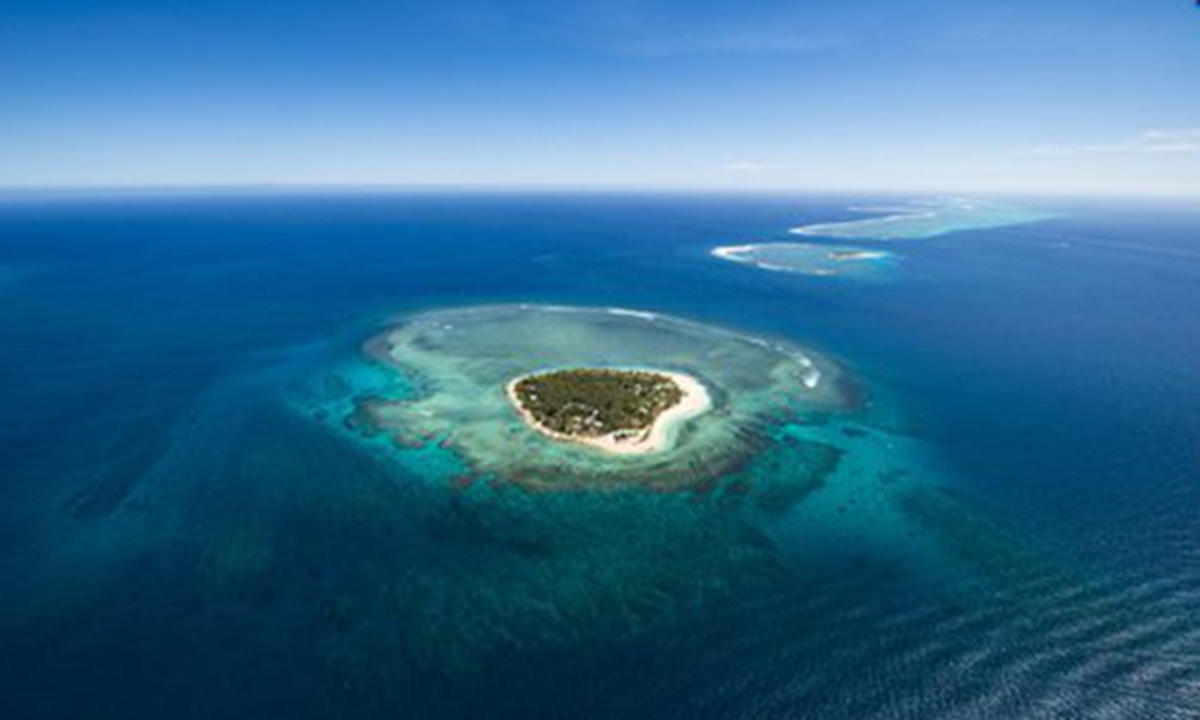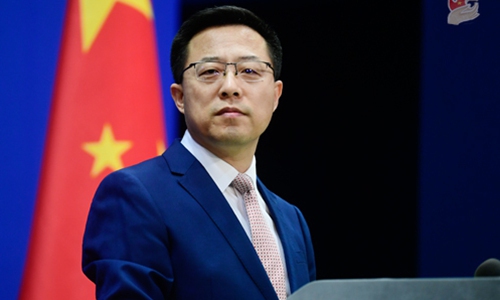
A bird's eye view of Tavarua, a heart shaped island of Fiji Photo: Courtesy of Tourism Fiji
When leaders of Pacific nations met in person for the first time since the COVID pandemic at the Pacific Islands Forum (PIF) in Suva of Fiji to discuss issues key to regional development, the US announced a package of measures including two embassies and more funding to boost engagement with the Pacific island countries (PICs) in a bid to counter China's influence and presence in the region.
As PICs are generally under developed and most vulnerable to the all sorts of challenges such as climate change, China welcomes all countries to offer support for their development, but observers noted the US, if prioritizes geopolitics targeting China over the real needs of the region, will find itself increasingly unpopular.
PICs tend not to take sides between China and the US, but have seen through US attempts to turn the South Pacific into forefront of competition against China. They will weigh US pledges and China's real commitments to make choices in favor of their interests, observers said.
US Vice President Kamala Harris made a virtual appearance at a fishing-themed panel under the PIF on Wednesday and announced the US will establish two new embassies in Tonga and Kiribati, according to a press release on Wednesday from the White House.
The US will return Peace Corps volunteers to the region and expand USAID's activities in the region. It plans to triple funding for Pacific islands from $21 million a year to $60 million a year for the next 10 years, upon Congress approval, Harris said.
The money was for tackling illegal fishing, which the US has blamed on China.
Chinese Foreign Ministry spokesperson Wang Wenbin said China has maintained good relationship with the PIF as a dialogue partner and is willing to see more countries support the development and revitalization of PICs when asked at Wednesday's routine press briefing to comment on the US move.
Any country's cooperation with the Pacific should be open and inclusive, not target or harm the interests of a third party. A country should not talk about openness and inclusiveness while form small circles behind the scene, Wang said.
"Some US officials said they do not ask Pacific island nations to take sides between China and the US and relevant cooperation does target China. We hope the US can do what it says," Wang stressed.
Wang also clarified on Wednesday's press briefing that this year's PIF did not hold activities with dialogue partners, including China and the US. Vice president Harris was invited to a fishing panel while the Chinese representative was invited to corresponding panels and events.
Geopolitical calculations
Harris on Wednesday mentioned the Partners in the Blue Pacific (PBP), an initiative which the White House announced on June 24 that includes Australia, Japan, New Zealand and the UK. The new initiative is part of US Indo-Pacific Strategy.
But the new initiative faces backlash from Pacific islands. In an article published on Fiji Times on July 7 ahead of the forum, the PBP was criticized as "deceptive, controlling and hypocritical."
The initiative upsets established structure set up by the Pacific islands states based on the doctrine of "friends to all." It effectively forms a special group of five "like-minded" partners with a shared interest in displacing or competing with China, according to the article.
The White House put PBP under the Pacific regionalism umbrella without permission and on its own terms. It excludes others such as China who are dialogue partners of the PIF, and who are clearly "delivering results" in the region, read the article.
Besides proposing a regional blueprint excluding China, the timing of US' sudden increase of engagement with the PICs already tells the country's purpose, as the US only notices the Pacific islands after seeing China in the region, observers said.
Harris acknowledged the diplomatic void that the US had left — "the Pacific islands may not have received the diplomatic attention and support that you deserve," she said.
Australian Prime Minister Anthony Albanese called Australian engagement with the region (Pacific islands), particularly in relation to Solomon Islands, "a stuff-up; we hadn't paid enough attention," the Guardian quoted Albanese as saying.
Australia and the Solomon Islands are in a diplomatic tension due to a security pact the latter signed with China in April. Albanese earlier said the security implications of China's growing influence in the region must be discussed at the forum in Suva.
Chen Hong, president of the Chinese Association of Australian Studies, told the Global Times on Wednesday that the US has long ignored the Pacific islands and Australia, the largest donor of South Pacific, has been cutting scale of support for PICs.
The two countries' sudden changes in policies after seeing China's presence demonstrated their goal was not to help PICs in development, but to contain China, said Chen, who is also the director of the Australian Studies Center at East China Normal University in Shanghai.
Some Pacific Island leaders have earlier pushed back against the focus on geopolitics. In May, Fijian Prime Minister Frank Bainimarama stated that Fiji's greatest concern is not geopolitics, but climate change. In June, Samoan Prime Minister Fiame Naomi Mata'afa criticized the way in which bigger countries had taken such a sudden interest in the Pacific, yet did not include Pacific Island countries in consultations over AUKUS, a recent trilateral security pact between Australia, the UK and the US.
True benefits
The limited Western aid is largely channeled to public institutions and social workers, with which the Western ideology was imposed on local societies. But local residents gradually realize they were trapped in values without substantial benefits, Chen said.
Dorothy Wickham, a Solomon Islands reporter, published an opinion piece on the New York Times on June 27 where she asked "Who can blame us if we open the door to new friends who can help with our needs?"
Wickham listed the lack of living basics in her country, including running water, basic sanitation and electricity, after US Peace Corps left more than two decades ago and Australian aids flatlined in the 2010s.
In contrast, Chinese-run businesses — construction, hardware, fishing, transport and other sectors — have quickly become part of the local economy since the Solomon Islands established diplomatic relations with China in 2019, according to Wickham.
For Pacific island nations, they also need to evaluate whether the US can fulfill its pledges, Lü Xiang, research fellow at the Chinese Academy of Social Sciences, told the Global Times on Wednesday.
The low approval rate of Biden will likely lead to a discrepancy between the Senate and the House after the mid-term elections, restricting US capabilities in foreign policy, Lü said.
The severe problems in US' internal affairs also drove the US isolationism, meaning Americans thought US overseas commitments were "too much rather than too little," the expert said.
Observers also warned the US, finding it ineffective to woo PICs with lip-services, will escalate slander on China's presence in the region, including hypes of the security pact with the Solomon islands.
Harris on Wednesday said that nations in the Pacific must be "free from aggression or coercion" in a clear reference to China, according to media reports.
Some Western media also connected Kiribati's withdrawal from the PIF to China to paint the latter as an element disturbing regional solidarity.
Despite Kiribati president listed four reasons for the withdrawal, including discontent over power distributions in the PIF framework, New Zealand outlet 1News said "there are growing suspicions Beijing is behind the country's exit," because Kiribati is strategically important to China due to nearby US Military installations and marine resources.
The Guardian cited Kiribati's opposition leader as saying that the country's withdrawal was driven by pressure from China.
The CNN also cited a British scholar to claim "there are China's instructions behind Kiribati's withdrawal."
The reports lack basic factual support. Some media outlets always hold a Cold War mentality in seeing China-PICs cooperation. They have hyped Kiribati's plan to reopen a protected marine zone for fishing and to upgrade an airstrip on Canton island, to slander China, ignoring Kiribati's official statement, the Chinese embassy to Kiribati said in a statement sent to the Global Times.
China and the PIF have cooperated well, and the relations between China and the island countries have maintained a healthy and stable development. China adheres to mutual respect and equal treatment principles, and always does not interfere in the internal affairs of Pacific island countries. China hopes that the PICs will strengthen solidarity and cooperation to achieve common development, read the statement.

